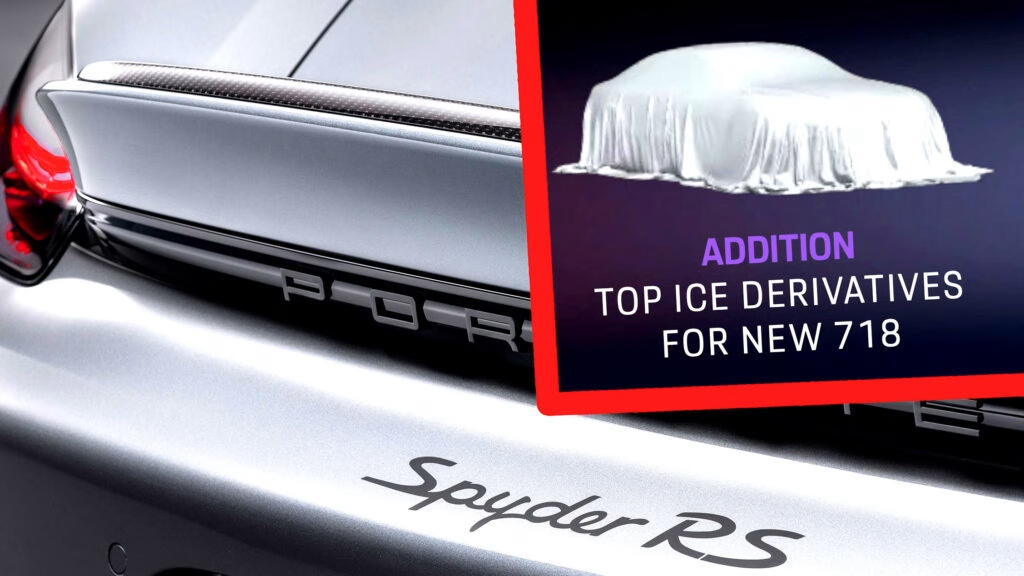Why Is Porsche Bringing Back Combustion Engines for the 718 Lineup?
Porsche has always had a knack for reading the room, even if it sometimes takes a detour or two. Remember when they thought the 928 could replace the 911? That didn’t quite pan out. More recently, Porsche planned to make the next-generation 718 Boxster and Cayman exclusively electric. But after watching the EV market cool off, they’ve decided to bring back a high-performance internal combustion engine (ICE) option for the 718 range.
What’s driving this U-turn? According to Porsche CEO Oliver Blume, the electric vehicle market just isn’t growing as fast as the company once predicted. On a recent investor call, Blume acknowledged that sticking to an EV-only strategy for the 718 simply doesn’t make sense in today’s climate. The result: Porsche is now planning to offer a limited-run, combustion-powered range-topper—likely wearing the RS badge—alongside the new electric models.
Will the New Boxster and Cayman Still Be Pure EVs?
Yes, for most buyers, the next-generation Boxster and Cayman—set to debut in 2026—will be all-electric. These cars have been developed from the ground up as EVs, featuring single and dual-motor setups that promise impressive straight-line speed and modern tech. Porsche’s engineers have poured years into perfecting the electric driving experience, aiming for that signature balance of performance and everyday usability.
But here’s the twist: while the bulk of the lineup will be electric, Porsche is carving out space at the top for a select few ICE models. Think of these as the ultimate enthusiast’s pick—likely more expensive, possibly quicker around a track, and almost certainly limited in number.
What Kind of Combustion Models Can We Expect?
Details are still under wraps, but the smart money is on replacements for the Cayman GT4, GT4 RS, and the 718 Spyder. These models have built a cult following thanks to their six-cylinder engines and razor-sharp handling. Porsche isn’t just bringing back combustion for nostalgia’s sake; they’re aiming to deliver “highly emotional” derivatives that cater to purists who crave the visceral feel and sound of a petrol engine.
Adapting the new electric platform to accept a combustion engine isn’t a simple plug-and-play job. It’s a significant engineering challenge, which means these ICE halo cars won’t arrive until later in the model cycle. If you’re hoping to snag one, patience (and probably a healthy bank account) will be key.
How Will the ICE and EV Models Compare on Performance?
Here’s where things get interesting. While the electric 718s will almost certainly dominate in straight-line acceleration—thanks to instant torque and all-wheel-drive options—Porsche insiders have hinted that the combustion models might still have the edge on a twisty track. Earlier this year, reports surfaced that Porsche’s EV prototypes were struggling to match the handling finesse of the outgoing ICE cars. That’s a big deal for a brand that’s built its reputation on driver engagement.
So, if you’re after the ultimate lap time or that old-school connection between car and driver, the ICE models could be your ticket. But if you want the latest tech and the thrill of silent, blistering acceleration, the electric versions will deliver in spades.
Is Porsche Changing Its Mind About EVs Across the Board?
It’s not just the 718 lineup getting a rethink. Porsche is also revising its electric plans for other models. The Macan, for example, was supposed to go EV-only, but now there’s a new range of combustion and plug-in hybrid versions in the pipeline. Even the upcoming flagship SUV, codenamed K1, will skip a battery-electric version entirely in favor of combustion and hybrid powertrains.
This isn’t a wholesale retreat from electrification—Porsche remains committed to EVs in the long run. But it’s a clear sign that they’re willing to adapt to market realities and customer demand, rather than sticking rigidly to a plan that no longer fits.
What Does This Mean for Enthusiasts and Collectors?
For die-hard Porsche fans, this is big news. The return of ICE models—especially in limited, high-performance guises—means there’s still room for the kind of analog driving thrills that made the brand famous. Expect these cars to be hotly sought after, both for their rarity and their connection to Porsche’s heritage.
Collectors are already eyeing these future models as potential classics. With tightening emissions regulations and the industry’s steady march toward electrification, these could be among the last new Porsches to offer a naturally aspirated, high-revving engine. If history is any guide, they’ll hold their value—and then some.
How Should Buyers Navigate the New 718 Lineup?
If you’re in the market for a 718, the next few years will offer more choice than ever. The electric models will suit those who want cutting-edge tech, daily usability, and the peace of mind that comes with future-proofing against emissions regulations. Meanwhile, the combustion range-toppers will appeal to purists and collectors who value driving feel above all else.
The key is to be clear about what matters most to you. Want the latest and greatest? Go electric. Crave the sound and sensation of a flat-six at full song? Keep your eyes peeled for those limited-run ICE models.
The big takeaway? Porsche’s 718 reboot isn’t about perfection—it’s about smarter adjustments. Start with one change this week, and you’ll likely spot the difference by month’s end.

